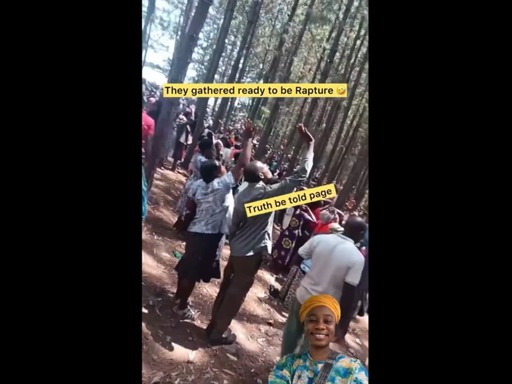Hundreds gathered in Johannesburg on 23 September for what they believed would be the rapture. Pastor Joshua Mhlakela had predicted that Jesus would return that night. By dawn, the sky was silent and the crowds slipped away.
But on TikTok, X, and YouTube, the prophecy took on a different life. Clips of the gathering went viral. Memes, jokes, and ridicule flooded the timeline. The rapture didn’t arrive — but the content definitely did.
“This is the end”… or is it?
The prophecy began with Mhlakela’s sermons, which spread far beyond South Africa. TikTok users remixed his warnings into trending sounds. From solemn countdowns to parody skits, the algorithm amplified every version.
One user turned the moment into pure comedy, painting the failed prophecy as nothing more than a bad night outdoors:
Man said Christ was clocking in on the 23rd, people packed a forest waiting for Uber Heaven, now it’s the 24th and they’re just hungry and bitten by mosquitoes.
https://t.co/p4ThieihX4
— Dee
(@DeeWaynee94) September 24, 2025
The joke landed hard because it turned a night of solemn waiting into absurd comedy.
Fear, faith, and satire around the rapture
Other users were less amused than confused. For them, the rapture hype felt too surreal to be real:
Is this actually real? https://t.co/35O3e5E3Tr
— The Holy Spirit is My Speed Force
(@leinad_segun) September 24, 2025
This disbelief became its own kind of content — fuelling the viral spread as people asked whether the whole thing could actually be happening. That shock only deepened as more footage emerged. Some users couldn’t quite believe what they were watching, even after hours of clips:
Fool, Fooler, Extraordinary Foolest
https://t.co/7l5qrZDpdf
— BIG IMO
(@ImoPunter) September 24, 2025
It was incredulity — people genuinely struggling to process how hundreds could gather for an event that never came.
Not everyone leaned into jokes or disbelief. Some quoted scripture itself, using biblical language to condemn the failed prophecy:
My people perish because they lack wisdom. https://t.co/ysKPlP6pQt
— MARAN ATHA

(@marshkov91) September 24, 2025
Here the focus shifts. Instead of mocking from the outside, the critique comes from within the same religious framework — rebuking the faithful for being misled.
A system that feeds on fear
Still others used the failed rapture to draw political comparisons, linking the mass gathering to cult-like movements elsewhere:
As stupid as Trump followers. Next thing they’re be in a stadium https://t.co/Ly9XX5NtoG
— Richard Campbell (@RichardC12516) September 24, 2025
This tweet reframes the prophecy as part of a global pattern: how mass belief, populism, and spectacle feed each other.
Meanwhile, some found humour in the contradictions of the gathering itself. If the faithful really expected to be swept to heaven, why bring earthly baggage?
So why did some of them carry bags? https://t.co/SnCG6MICLO
— Hardy (@Onyiax9) September 24, 2025
The observational humour works because it highlights the everyday absurdities within an apocalyptic claim.
The rapture spectacle meets social media
As the night ended, others focused on the anticlimax. Instead of rising to heaven, the faithful had to trudge home again:
Lol… these mfs had to walk back home. A walk of shame… https://t.co/kV378fiWVO
— Lynx
(@glynx7) September 24, 2025
The “walk of shame” image captured the mood: what was meant to be ascension ended in embarrassment.
Finally, some believers themselves weighed in — angry not at the mockery, but at the damage done to their own faith community:
despite how I tweet I’m religious, I despise the term ‘religious psychosis’ so much but when you do shit like this I can’t even blame them, He said it in the scriptures that no man knows when it would happen but yet ‘christians’ who should be adept in His word pull shit like this https://t.co/tdt3pJlufB
— 𝓲𝓷(𝓼𝓪𝓷𝓲𝓽𝔂)
(@notthatcrazyfr) September 24, 2025
This tweet closes the circle. Even within faith, the prophecy was seen as humiliating — a distraction that undermines belief itself.
The 2025 rapture didn’t come. But the event was still revealing. It showed how quickly platforms amplify fear. It showed how poverty and uncertainty make prophecy powerful. And it showed how media prefer to mock than to ask deeper questions.
The end of the world wasn’t livestreamed from Johannesburg. But the commodification of hope and fear? That’s happening every day.
Featured image via the Canary
From Canary via this RSS feed



